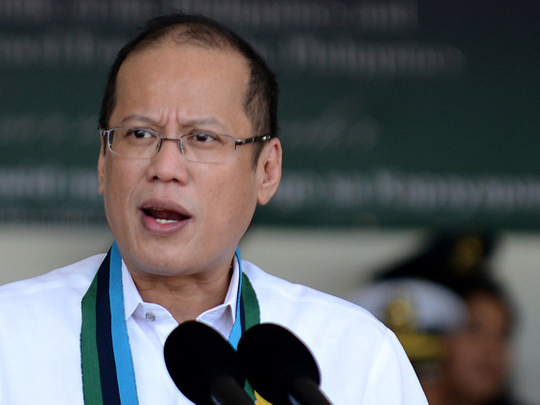
Say what you want about Benigno Aquino, but the Philippines president has some brass. First he arrested predecessor Gloria Arroyo on corruption charges and ousted her Supreme Court chief justice. Then he took on the powerful Catholic Church, shepherding free-contraception laws that enraged the Vatican. Next he ran afoul of the local tycoons by backing higher taxes on cigarettes and alcohol.
By tackling these issues along with economic reforms, Aquino’s country is on the way towards an investment-grade credit rating. Now Aquino is taking on an immeasurably bigger target: China.
The Philippines will challenge China’s maritime claims before a United Nations-endorsed tribunal. This isn’t going over well in China, and it’s sure to raise tensions as Asia vies for oil, gas and fisheries resources and a ruling on competing views of history in contested waters.
Much of it really is an argument over China’s controversial ‘nine-dash’ map. First published in the late 1940s, the map extends China’s territorial claims as much as 800 miles from Hainan Island to the equatorial waters off the coast of Borneo. China says the map proves its “indisputable sovereignty” over more than 100 islands, atolls and reefs that form the Paracel and Spratly Islands. The rest of Asia disagrees.
This dispute represents something more for political scientists, such as Ian Bremmer. As leaders and investors alike try to navigate a world they no longer understand, they are turning to Bremmer, the president of Eurasia Group in New York, and his ilk for perspective. And when Bremmer considers the biggest threats in the year ahead, East Asian brinkmanship is near the top of the list.
“At risk here is the decades-long pattern of East Asia as a zone where positive-sum commerce and economics trumps zero-sum geopolitical tension,” Bremmer says. US Secretary of State Hillary Clinton and Defence Secretary Leon Panetta are right to worry about military conflict.
The intensifying spat over a group of tiny islands that Japan calls Senkaku and China calls Diaoyu is the most dangerous flash point. Strains rose last year after Japan effectively nationalised the islands. At first, it was just about fishing rights and coast guard vessels squaring off.
From April to December, there was a disturbing trend: Tokyo’s Self-Defence Force scrambled fighter jets 160 times against Chinese aircraft approaching Japanese airspace. That’s the highest number of aerial contacts since Japan began releasing such data and is a significant proxy for escalating tensions. Markets seem convinced that pragmatism will rule the day.
China needs rapid growth to ensure the Communist Party’s grip on power, and Shinzo Abe, Japan’s new prime minister, aims to revive his nation’s moribund economy. The primacy of commerce, the conventional wisdom says, will prevail. This sunny view ignores how nationalism clouds Asia’s judgement. China doesn’t deserve all the blame. Japan, too, has a disproportionate number of territorial quarrels — with Russia, South Korea and Taiwan.
Abe, a nationalist, wants to alter Japan’s pacifist constitution. But China’s assertiveness and fast-growing military apparatus, which now includes an aircraft carrier, is generating concern throughout the region as well as the US. Asia has never been closer economically, yet it’s growing further apart diplomatically. It lacks a credible forum where disagreements can be aired, a void that strengthens China’s hand.
China has been adept at using its economic leverage over tiny nations such as Cambodia and Laos to block multilateral talks or actions. This forces the United States into the uncomfortable position of balancing competing economic and security priorities with a fast-rising rival. By resorting to international law, Aquino is taking a positive step.
The way to address and resolve the dispute is through diplomacy, not with navy ships or hot tempers that risk turning minor confrontations into something much bigger. Yet this is only the beginning.
Last year marked a turning point as an economically dominant China shifted from charm-offensive mode to political and military assertiveness. This is playing out against the backdrop of the ascension of Xi Jinping as China’s leader, and what that will bring in 2013 and beyond.
Confronted by a daunting list of domestic challenges, Xi will focus on consolidating domestic power. It is farfetched to think he would yield ground on diplomatic issues if it risks an internal backlash.
“If Beijing faces a foreign policy test, Xi will have a strong incentive to demonstrate his foreign-policy mettle and avoid being seen as capitulating to outside interests,” Bremmer says. “That dynamic suggests less chance of compromise from Asia’s emerging strategic powerhouse and heightened risk throughout the region.”
Tests could come from many places — a new Japanese government anxious to flex its muscles; US President Barack Obama’s pivot to Asia; provocations from North Korea that put the onus on China, Pyongyang’s crucial supporter; or nations like the Philippines taking diplomatic frustrations to the UN. Aquino is the first Asian leader willing to call China’s bluff and risk economic retaliation. How he navigates this showdown will be instructive for others when their turn comes.
— Washington Post
William Pesek is a Bloomberg View columnist.









